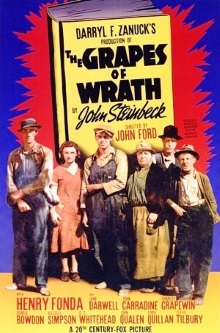
We’re not completely out of all-time-great films yet. This one was included in the US National Film Registry which officially makes it a great American film and it’s also an adaptation of a great American novel. I understand that the novel is required reading for most US students. This adaptation was directed by John Ford, another great American director who is best known for westerns.
It’s the depths of the Depression and Tom Joad returns from a stint in prison to find his family home abandoned. Due the poor economy and the deteriorating soil, the farmers have been chased off the land by landowners in favor of larger scale farming with machines. He finds his family with an uncle and together with a former preacher named Casy, they travel to California in search of jobs and a better future in an overloaded truck. The trip along the famous Route 66 is arduous and the grandfather and grandmother of the family die along the way. Upon arriving, they find that theirs is only one among thousands of other families who have made the trip in search of scarce jobs. The business owners take advantage of this huge surplus labor to drive wages down to subsistence levels while the local police serve the interests of business and not the people by cracking down on anyone who complains about the injustices. Casy tries to speak up for the workers’ rights and is eventually killed for it. Their fortunes only improve when they manage to find a camp run by the federal government.
This is a surprisingly dark tale even though it has been significantly watered down from the novel. It’s pretty obvious that the one good camp that the family finds represents a deviation from the source material as it’s so incongruous with the tone of the rest of the film. It doesn’t make much sense why the Department of Agriculture would side with the Okies while the police are against them either. Still this film hits plenty hard, what with the images of hungry children, the endless queues of what are effectively refugees in their own country and the heartlessness of the city folk who would turn them away. I was also shocked by how explicitly leftist it is given the year it was made. Apparently even the producer was worried that he would be called a Communist for making it and covered his bases by firmly establishing the truth that the plight of the migrants from Oklahama is all too real.
The characters here feel more like archetypes than unique individuals so you feel for the class that they represent instead of them personally. This is probably what the director intended and works well, such that the film feels like a piece of recorded history. I can’t say that any of it is particularly new to me but it was poignant enough to prompt some conversations with my wife. I was reminded of my working experiences in the Solomon Islands and indeed we operated camps and company stores for the local workers there as well. I don’t believe that we were ever truly abusive but it’s important to note the disparity in bargaining power between employer and employee in that sort of situation. Watching this, one can’t help but think of ways to ensure that such abuses never happen. The main thing is still to have the levers of government work for the people and not businesses, which is of course easier said than done.
I ended up liking this more than I expected and makes for a great reminder of how poorly America treated and still treats the destitute. The ending remains too preachy and inconsistent with the rest of the film though I note that critics of the time actually praised this aspect as being superior to the darkness of the original novel.
One thought on “The Grapes of Wrath (1940)”